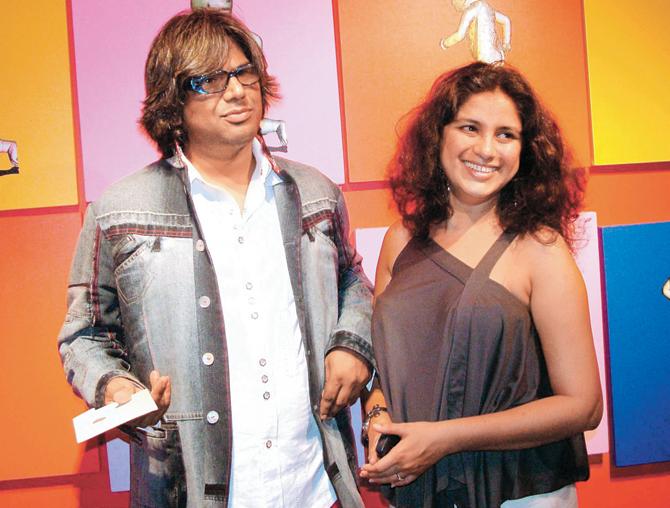A question that’s a mash-up of ego and the lure of financial security is fast becoming fundamental to most urban divorces, resulting in severe acrimony. Is the law to blame, the lawyers, or couples themselves?

Artist couple Chintan and Hema Upadhyay were involved in an acrimonious alimony battle
A Bombay High Court ruling dated February 24, 2014, couldn't have been sweet music to the ears of women fighting an alimony suit.
ADVERTISEMENT
A division bench of Justice Vijaya Kapse-Tahilramani and Justice PN Deshmukh rejected an application by a 61-year-old Andheri resident who was seeking Rs 15,000 in monthly maintenance from her Australia-based husband.

Artist couple Chintan and Hema Upadhyay were involved in an acrimonious alimony battle
Investments in fixed deposits and mutual funds to the tune of Rs 50 lakh earning her a monthly interest of Rs 37,500, and a home belonging to the husband that she now exclusively occupied, led the court to rule that a financially stable spouse couldn’t demand maintenance.
The couple had been living separately since 2007.
Often, maintenance payments are at the centre of prolonged divorce settlement cases, with slander, spying and counter-allegations making a frequent appearance.

Representational picture
While the December 2015 double murder of successful contemporary artist Hema Upadhyay and her lawyer Haresh Bhambani is yet to solved (prime accused Vidyadhar Rajbhar absconding and the police are finding little to stick on Hema’s estranged artist husband Chintan Upadhyay, who is being investigated as co-accused), the recurrent imagery in the tragic deaths is that of the couple’s unpleasant divorce and tussle over alimony.
In 2013, Hema, who’d married her batchmate from MSU, Baroda, filed a case under the Representation of Women (Prohibition) Act, alleging that he had drawn etchings on the walls of their joint matrimonial Juhu home, showing women in poor light and to humiliate her. The strays Hema cared for, Chintan didn’t quite approve of, and got a court injunction for their movement to be limited to her side of the apartment. “The Juhu home and the Kandivili warehouse — both properties that Hema eventually occupied — were a point of contention between the couple,” said a friend of Chintan’s, referring to Chintan’s eventual move to Delhi where he is now settled. “With the nude drawings complaint that Hema lodged against him, she created a bad reputation for him,” said the friend, requesting anonymity. Referring to what he claims was a police complaint filed by Chintan before Hema’s in 2013, he said Chintan had accused his wife of physical assault. “But the media in particular, and society in general, often see the woman as sole victim. What about the man?”
In October 2014, the couple was granted divorce but the alimony dispute continued. The family court had passed a decree in favour of Chintan while granting divorce, not mentioning any maintenance. Hema had challenged it in the high court. Based on an interim order, Chintan was to pay Rs 40,000 to Hema every month and close to Rs 16 lakh in arrears. The police in their investigation say they learnt that Hema was pushing to up the monthly amount to Rs 1 lakh.
This, say Chintan’s sympathizers, despite the fact that her own family had agreed that she was the more successful of the two, and that was reason for Chintan’s insecurities.
Although they are vociferous in their defence of the artist, questioning how a compromising video, which Vidyadhar claimed he had acquired from Chintan’s disgruntled Jaipur househelp, could work as “clinching evidence” against him in what was now just an alimony suit, the police have said Chintan had been pushed to the wall and wished to end the haggling once and for all.
Rajbhar, who worked with both, Hema and Chintan as fabricator and was an old associate of the latter, had made a call to Hema on December 11, promising to share the video that would prove damaging to Chintan in court. Thus, he set a trap for her to arrive at the Kandivli warehouse where she was eventually smothered, her body packed in a carton and thrown into a nullah. The police claim Rajbhar made the call on Chintan’s advice in what was a conspiracy planned over months.
Some reports have claimed that Chintan admitted to taking photographs of the warehouse Hema used in order to offer in court as proof of her financial stability, and that Hema had in turn spied on him in the past.
Collecting “evidence” against a spouse, say lawyers, is one of the most common tactics used in contested divorces.
And although divorces are never easy, for both, man and woman, observers agree that often, men have the shorter end of the stick since they are traditionally viewed as “providers” who must fulfill their duty of caring for the woman, even after the relationship has ended. Advocates say, the laws, especially 498A which deals with dowry and the Domestic Violence Act, favour women. “But in India, eight out of 10 cases are genuinely against women. But yes, in the upper middle class and affluent sections, the woman has been seen to exploit the law,” says divorce lawyer Vandana Shah.
Taking stock of the workings of her own lot, Shah says, like in the Hema-Chintan alimony suit, it’s the lawyers representing the couple that can choose to stretch matters. “Hema’s representative could have advised her differently. Arbitration and mediation by a judge are some of the alternatives that that could have been employed,” she adds.
A source close to the couple had told mid-day earlier that the two were considering an out of court settlement, and Hema had spoken to a close artist friend about thrashing things out amicably with Chintan in the presence of trusted friends. Senior artist and someone who knew the two since the 90s, Bose Krishnamachari told mid-day that reports of an ugly divorce weren’t entirely true. But he did hint at the role of lawyers when he said, “Chintan had come to me in a very disturbed state of mind when Hema had complained about him drawing obscene figures on the walls of their home. It was a bit of a surprise then, because we know that all of Chintan’s works have had pornographic clips or some such stuff. You know how lawyers perceive things differently.”
Bhambani had represented Hema in the divorce case right through, and police claim that investigations have revealed that it was on his suggestion that Hema decided to appeal in HC after the family court ruled in Chintan’s favour.
This, say cops, make it possible that Bhambani wasn't an unintended target and the accused knew that Hema would bring him along to the warehouse since the “evidence” concerned her divorce.
Solicitor and advocate Nityoah Mehta says good advice by lawyers is pivotal in divorce proceedings. “Unfortunately, our laws insist that you prove that you need a divorce. That’s how desperation sets in. Isn’t a couple coming to file for divorce reason enough? If they are asking for it, it should be granted.”
The ego is protagonist in these fights, with revenge as companion. The list of demands that a spouse makes are almost always unrealistic initially. Mehta speaks of an affluent woman and mother to two seeking divorce from her husband of eight years, who is Mehta’s client. With the intention of making him “suffer”, she has shared information that could lead to an IT raid at his office. Mehta sees this as nothing short of bullying.
Shah feels the American divorce system, where separation is distilled down to a mathematical equation, is finally here. “In America, if you experience an upsurge in your career during your marriage, you can ask for a share of the profit.” Indian divorces are seeing alimony figures touching the sky. “The money that you acquire or manage to retain, is in a way, seen as your worth,” she says. She is reminded of a chartered accountant who was separating from her husband of two years, and demanding an alimony of Rs 5 crore because her parents had spent Rs 35 lakh on the wedding. “I told her, you are never going to get it. And she said, ‘that’s fine, but I want him to know my value’.” In another high-profile Mumbai case, a politician and his wife, who is pregnant after six months of marriage, have decided to file for divorce. The woman, who has since then had the baby, says she wants him to give her a flat and R5 crore. “She says he is worth Rs 150 crore, and owns 10 flats in South Mumbai. Why can't I get one? I told her I’ll fight for him to look after the child, not the five crore. He is ready to pay her R80 lakh, but she doesn’t want to settle.”
It’s then the lawyer’s interjection and persuasion that could count. Shah claims she walked out of a case because a spouse
wanted to call the partner’s bosses for cross questioning to prove the partner was having an affair. “This was strange because the spouse didn’t care if the partner was with someone else. The humiliation was the goal.”
Couples counsellor Sheetal Mehta sees this as a larger malaise. “Couples are angrier than before,” she says. Love and hatred are being expressed in extreme terms. “Last week, a couple indulged in a slapping match right in front of me during a session. Tolerance levels have reduced drastically.” The wrangling and bargaining over who will get what makes professionals like private investigators key in proving one's point. Prashant Palekar of Magnum Investigations has been a detective for 15 years.
Divorce cases are every investigator's bread and butter, he says. “If a spouse is asking for alimony by claiming lack of financial security, we go undercover and get hold of their salary slips. We have people everywhere; we can sometimes even get a contact inside their office. Or we pose as loan advisors and say, ‘We will get you a loan…’."
The other top reason for hiring him is to gather evidence that a spouse is having an affair. Advocate Fazaa Shroff Garg puts it eloquently, when she says that a beginning needs dignity and so does an end. She wishes couple displayed maturity during divorce. “When I represent the man, I say, if you have it, give it. When I represent the woman, I say, get what you can and move on. Lawyers are moral conscience keepers. We have to put our foot down when we see a situation is unrealistic.”
 Subscribe today by clicking the link and stay updated with the latest news!" Click here!
Subscribe today by clicking the link and stay updated with the latest news!" Click here!








